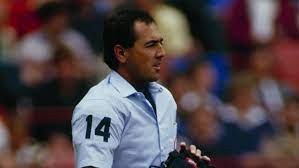
December 16, 2016 – For the most part, anonymity is a good thing for umpires. They tend to get noticed only when they make what are perceived, by managers, players, or fans, as mistakes. On the other hand, there are some umpires whose performance sets them apart in a positive way. Steve Palermo was one of those umpires.
The grandson of four Italian immigrants, the Worcester, Massachusetts native became a major-league umpire in 1977 at the age of 26 after a rapid ascent through the minor leagues. He was soon acknowledged as one the best in the game, gaining the respect of players, managers, and fellow umpires. Dan Bellino, a major-league umpire since 2011, said of Palermo: “Ask anybody that worked with him or worked in that era and they all say Steve Palermo would’ve been a Hall of Fame umpire. He was that good. Some guys were born to be umpires; Steve was one of them.”
Palermo was part of the umpiring crew in the 1983 World Series, four American League Championship Series, and the 1986 All-Star Game. On July 4, 1983, he was the home plate umpire for Dave Righetti’s no-hitter against the Red Sox at Yankee Stadium. He was also the third base umpire who made the fair call on Bucky Dent’s decisive home run in the 1978 AL East tie-breaker game between the Yankees and Red Sox at Fenway park, a call that disappointed his father, a Red Sox fan.
On July 6, 1991, in the midst of his 15th season, his on-field career was cut short by a bullet wound he suffered while coming to the rescue of two women who were being beaten and robbed outside a restaurant in Dallas, Texas. Doctors told him he would never walk again, but Palermo rejected that prognosis and for almost five years went through the painful rehabilitation process that enabled him to walk with the aid of a cane. In 2000 he was named an Umpire Supervisor by Major League Baseball, a position he held until his death on May 14, 2017, at the age of 67 after battling cancer.
Palermo provides insights into the world of umpiring and talks about the intricacies of dealing with players and managers, his role as a supervisor of major league umpires, and how he dealt with his life-changing injury.
